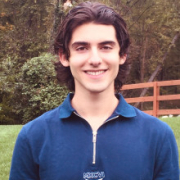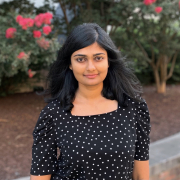Four Ph.D. Students Honored with Ann G. Wylie Dissertation Fellowship
The University of Maryland's Graduate School has announced Department of Computer Science graduate students Nakul Garg, Shoken Kaneko, Mazda Moayeri and Gowthami Somepalli as recipients of the Ann G. Wylie Dissertation Fellowship, an award recognizing outstanding research contributions and academic performance by doctoral students in the later stages of their dissertation research.
The Ann G. Wylie Dissertation Fellowship is a testament to the university's commitment to fostering academic excellence and research innovation. It includes a $15,000 stipend, a candidacy tuition award and additional benefits to facilitate the completion of innovative dissertation work.
Inaugurated in 2005, the award is named in honor of Department of Geology Professor Emerita Ann G. Wylie. The fellowship underscores the importance of academic and research endeavors at the University of Maryland. It is a key component of the Graduate School's efforts to nurture doctoral candidates' academic and professional development.
The research focuses of the awardees are:
Nakul Garg
Garg is a Ph.D. student advised by Assistant Professor Nirupam Roy. His research focuses on the development of sustainable computing technologies. Garg primarily deals with batteryless, AI-driven ambient computing technologies that enhance operational longevity and intelligence while reducing power requirements. His work is intended to support the creation of smarter cities, increase supply chain efficiencies and further develop advanced healthcare systems with a reduced environmental footprint.
"I'm thrilled to receive this award as it motivates me to advance our research aimed at societal benefit," Garg said. "This fellowship allows me to focus more on achieving my goals and sharing our findings widely. I'm grateful to the award committee, friends, colleagues and family for their support, and especially to my advisor, Dr. Nirupam Roy, for his fundamental guidance."
In addition to his fellowship, Garg has collaborated with Microsoft Research to investigate AI solutions in supply chains, specifically focusing on dynamic tracking systems to reduce global food waste. His projects also include developing next-generation batteryless tags for applications like geofencing, wildlife monitoring and environmental sensing.
Garg plans to explore ambient computing's capabilities further using AI and machine learning to address challenges in egocentric sensing, perception and communications. After completing his Ph.D., he is considering founding a company to commercialize his research and maintain his contributions to the academic field.
Shoken Kaneko
Kaneko is a Ph.D. student advised by Professor Ramani Duraiswami. His work focuses on computational audio and acoustics, specifically spatial audio and boundary element analysis. His work aims to improve numerical simulations in acoustics and electrostatics, enhancing accuracy and reducing costs.
 "Winning the award is a great honor," Kaneko said. "The fellowship stabilized my household and allowed me to concentrate on my research, freeing me from teaching and research assistant duties last semester."
"Winning the award is a great honor," Kaneko said. "The fellowship stabilized my household and allowed me to concentrate on my research, freeing me from teaching and research assistant duties last semester."
Kaneko has developed algorithms that could significantly improve the efficiency of numerical simulations.
"The methods I've worked on improve spatial audio capture and processing, audio rendering, and sound localization," Kaneko explained. "My research could fundamentally change how we simulate and interact with audio in real-world and virtual environments, like virtual reality and the metaverse."
Looking ahead, he plans to refine spatial audio technologies and further develop engineering tools for audio and acoustics, aiming to enhance how audio is integrated and manipulated in physical and digital spaces.
Mazda Moayeri
Mazda Moayeri is a Ph.D. student advised by Associate Professor Soheil Feizi. Moayeri's research centers on building interpretability tools for artificial intelligence, aiming to enhance transparency and mitigate the risks associated with AI. His research addresses potential limitations within AI systems to prevent harmful impacts, making strides toward safer, more reliable and more equitable AI applications across different societal sectors.
 "I am excited to receive this award and be among such esteemed company," Moayeri said. "The others I've seen win this award have always been big inspirations to me, and it is an honor to join them. Research is full of ups and downs, and imposter syndrome can hit hard, especially in AI, so it feels great to get a sign that maybe I'm doing an OK job after all. I would also like to thank my advisers and collaborators who helped me get here."
"I am excited to receive this award and be among such esteemed company," Moayeri said. "The others I've seen win this award have always been big inspirations to me, and it is an honor to join them. Research is full of ups and downs, and imposter syndrome can hit hard, especially in AI, so it feels great to get a sign that maybe I'm doing an OK job after all. I would also like to thank my advisers and collaborators who helped me get here."
Moayeri's work promises to fundamentally alter how society interacts with AI by making the technology's inner workings more accessible and understandable.
"AI is incredible because it can be applied to so many problems, and it is advancing at an astonishing rate," Moayeri explained. "A technology so wide-reaching is exciting but also scary, as the risks rise with the number of use cases, especially since we don't always know what's going on under the hood. My work aims to create a future where people can confidently decide when to rely on AI by enhancing the technology's transparency and proactively addressing bias issues before they cause harm."
Looking forward, Moayeri plans to continue exploring the field of AI, likely transitioning to industry roles that emphasize the societal impacts of technological advancements.
"I truly believe AI can empower all of us, but I also worry that it may widen existing gaps in our society," Moayeri stated. "I hope to build tools that put the power of AI in people's hands instead of cruelly replacing them. The exact problems I work on will evolve as the field does, which it currently is doing, but I will always care about fair AI, bias mitigation, model debugging and increasing transparency."
Gowthami Somepalli
Somepalli is a Ph.D. student advised by Professor Tom Goldstein. Her research focuses on identifying and addressing failure modes in multimodal deep learning models, aiming to enhance their reliability and functionality. Somepalli's work has notably included a study on understanding and memorization in diffusion models, which has significant implications for their practical application across various industries.
 "I feel honored and inspired to have received this award," Somepalli said. "I am grateful to Professor Goldstein and my collaborators who have supported me throughout my Ph.D. journey."
"I feel honored and inspired to have received this award," Somepalli said. "I am grateful to Professor Goldstein and my collaborators who have supported me throughout my Ph.D. journey."
In addition to her primary research focus, Somepalli is enhancing vision large language models (LLMs), exploring ways to bolster their efficiency and applicability. This work aligns with her broader objectives to address critical challenges in deep learning technologies.
"My work aims to ensure that deep learning systems have a significantly reduced failure rate before they can be utilized on a large scale," Somepalli explained. "The application of my research in diffusion models was notably referenced during the Stable Diffusion lawsuit, and Stability AI has incorporated it in their recent SD3 model to minimize memorization."
Looking ahead, Somepalli plans to continue her research on improving multimodal systems. "Tackling the robustness of these systems is both a challenging and essential task," she remarked, emphasizing the importance of her future endeavors in contributing to the field of artificial intelligence.
—Story by Samuel Malede Zewdu, CS Communications
The Department welcomes comments, suggestions and corrections. Send email to editor@cs.umd.edu.
